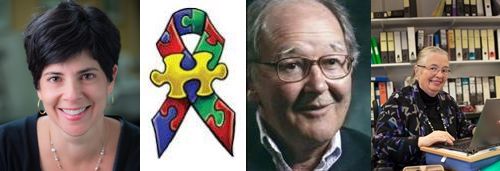A month or so ago, in an unrelated e-mail exchange, autism philanthropist, ex-lawyer, mother to nonverbal autism, and major supporter of research Jill Escher asked me a question.
“I’m just curious, did your mom smoke, or did your mother in law?”
“Mom and Dad both were lifelong smokers, Pall Mall, unfiltered. My Mother in Law, never. Is there research happening in this regard?” was my reply.
Hoo boy, is there.
There’s disagreement, as there is with so much in autism, about what logo should represent it, but the two I see most often are the multicolored ribbon and the multicolored puzzle piece. In part, they visually represent the complex nature of the disorder (and sorry, but for me, it’s a potentially devastating disorder, not simply a “difference,” just so my cards are on the table).
It’s possible we have another piece.
Smoking.
Jill’s the head honcho of the Escher Fund for Autism, which funded a study, the results of which were published last week in Scientific Reports:
“Grand-maternal smoking in pregnancy and grandchild’s autistic traits and diagnosed autism” (Jean Golding and Marcus Pembrey, et al. of the University of Bristol, major players in autism and genetics research).
It’s a compelling read.

This is a link to Jill’s report on the study, <autism-linked-to-maternal-grandmothers-smoking-in-pregnancy>, with details and a discussion that is understandable to the layman (i.e. me) but detailed enough that science geeks will get the stuff I don’t, along with a link to the study. There’s no reason for me to go into detail because Jill does.
Like most research, the study’s not perfect (parental self-reporting was part of it, always adding potential for error, the number of participants was decent but not huge, and there’s not enough data to make a call on the patrilineal line, only the matrilineal), so as almost always, more work needs to be done in this specific area.
But the bottom (and top) line is that these “researchers found a notable increased risk of autism and autism-related traits when the grandmother had smoked cigarettes when pregnant with the mother.”
That makes sense to me.
The nuclear explosion in the rate of autism, from 1 in 10,000 (as cited in the nineteen-eighties textbook I picked up in 1995 when our son Ben was diagnosed at two) to one in 68 these days (according to the Centers for Disease Control), is considered by some, including many medical professionals, as simply a result of better diagnosis and an expanded range on a spectrum of what counts as autism.
And I call that bullsh… er, highly questionable.
If you’ve been alive for a while and have been awake, you see autism everywhere where you rarely saw it when you were growing up. Anecdotal, sure. That doesn’t make it wrong.
I’ve wondered why — what is it that has changed? I’ve thought since the beginning that autism’s cause is a combination of genetics and environment. Total conjecture on my part? Sure. That doesn’t make it wrong.
I’ve often found myself flashing back to the 1967 movie, The Graduate, when college grad Benjamin Braddock (Dustin Hoffman) is given some unsolicited advice for his future by a family friend: “I just want to say one word to you. Just one word. Plastics.”
The development and ubiquitous use of plastics parallels the timeline of the autism (yes) epidemic. And what else would be more calamitous than if it were that? Plastic is in virtually everything everywhere. If plastic disappeared in a flash, our modern world would instantly crumble. The economics alone – wow.
But smoking? That makes sense too, and it’s a much better bad guy, since it’s already a known scourge being, as much as possible, phased out by our society.
And this research backs it up. Cigarette consumption statistics coincide with the grandmothers of our autistic men and women. And, it’s all about smoking’s effect on genes (germline perturbations, to be geekily specific).
To be honest, a part of me has been dreading something like this. I’ve worried that one of the culprits would turn out to be something volitional that didn’t need to happen. The thought that Mom (or Dad), both born in the early 1930s, might have been, at least in part, “responsible” for Ben’s tragedy makes me sick. It was already likely responsible for their early demises. (Dad spent a lifetime smoking – drinking too — and checked out at 64; Mom was an early adopter of the birth control pill, and the knowledge that smoking combined with the pill brought aneurysms dawned only soon after she died at 44 — of an aneurysm.)
So, toss another log, or another pack, on to the cigarette’s funeral pyre. As if it needed another one.
I don’t really have much more to add to what Jill writes, but if autism is on your mind, we’re fortunate to have it on her mind as well, and her cohorts, colleagues and researchers who are looking into it, deeply and thoughtfully.
The puzzle demands it if we ever hope to put it all together.

~~~
